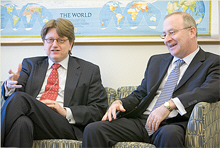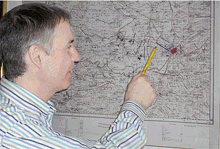
Typical street scene in Santa Ana, El Salvador. (Photo: iStock)
IMF Survey: IMF Aims for Flexibility, Rapid Response in Middle East
April 1, 2008
- Lack of reliable data complicates analysis, limits assessment of policy options
- Fiscal stability, market economy sometimes seen as abstract concepts
- Meeting country needs, helping rebuild war-torn nations is heart of mission
You need to don mental blinders to block out some of the realities of the day-to-day security issues.

IMF Iraq mission chief Erik de Vrijer (l) with Afghanistan mission chief Mohamad Hassan Elhage (IMF photo)
POST-CONFLICT COUNTRIES
But you also need to pay attention to the day-to-day realities—border closures, car bombings, political disarray—as they impact the effort to put structure around government finances and budgets.
This is the paradox faced by the three teams charged with providing financial and budgetary guidance in three of the most politically complex pieces of real estate in the world: Afghanistan, Iraq and the West Bank and Gaza.
"Working on a post-conflict country requires the Fund to be flexible and to focus on immediate priorities," notes Afghanistan mission chief Mohamad Hassan Elhage. "This means that sometimes the first best solutions are not feasible in the short term." Adds West Bank and Gaza mission chief Oussama Kanaan, "You try to keep your efforts steady and focused, and not get easily discouraged by setbacks or too thrilled by successes."
Aside from the unstable security situation, destroyed infrastructure, disrupted economy and weakened financial institutions, such countries lack comprehensive and reliable data. This complicates economic analysis and limits staff's ability to assess the relative merits of different policy options.
It also elevates the role of the Fund. "The Fund's policy advice and technical assistance play an unusually positive role," says Iraq mission chief Erik De Vrijer. "Fixing the economy is a major priority for the government because the stakes are so high."
IMF and post-conflict countries
The PRGF arrangement for the Islamic Republic of Afghanistan was approved in June 2006 for a total of SDR 81.0 million (about US$128 million).
The successor Stand-By Arrangement for Iraq was approved in December 2007 for an amount equivalent to SDR 475.36 million (about US$744 million).
For West Bank and Gaza, IMF staff provides policy advice and technical assistance to the Palestinian Authority, and conducts quarterly reviews of macroeconomic and fiscal reforms. These reviews are taken into account by donors in their disbursement decisions.
The security situation remains so difficult in Iraq that Fund staff cannot travel to the country. While this has complicated the team's efforts, there has been a positive side benefit. "When we meet with the authorities, we all have to travel to a location outside Iraq, and we have them to ourselves, without interruptions," De Vrijer says. Team member Udo Kock adds that the off-site meetings have allowed for a degree of informality, and have helped form stronger personal relationships with the Iraqis. "Every disadvantage has its advantages," they say with a laugh.
Iraq has performed very well on the Fund's Stand-By Arrangement, De Vrijer and Kock say, with some notable successes: inflation dropped from 65 percent in 2006 to less than 5 percent in 2007, helped by an appreciation of the exchange rate. "The inflation reduction has been almost unprecedented," De Vrijer says.
Fiscal discipline
The program also supported increasing domestic fuel prices, which the authorities implemented and which resulted in all but eliminating direct fuel subsidies. "It was politically very courageous, because it was very unpopular at first," he says. Fiscal discipline has been maintained despite the very difficult security situation.
The IMF also helped Iraq introduce a new currency, establish a new pension system, begin modernizing public financial management, and strengthen the central bank. "For an economist, working on Iraq has been a peak experience," Kock says.
In Afghanistan, where the Fund has a PRGF program, the Fund can also take pride in some tangible successes: efforts have helped address macroeconomic imbalances and restore macro stability, while improving confidence in the local currency and bringing inflation under control.
But it is not always a simple task to get government officials to focus on the macroeconomic agenda when other pressing issues, such as post-war reconstruction, would seem to take priority. "It is a slow and complex process," Elhage says. "Sometimes fiscal stability and achieving a market economy are perceived as abstract concepts. An important part of our role is to help the relevant parties see why these objectives are important, how to achieve them, and how they benefit the country."
Dangerous assignment
Elhage notes that the work in Afghanistan comes with stresses that are not common in peacetime economies. Last November, a car bomb exploded directly outside the Fund's compound in Kabul; such explosions happen frequently in this city. "This is sometimes a dangerous assignment," he acknowledges.
The realities on the ground in conflict-affected areas require a nimble approach and an ability to respond swiftly in an environment that can change dramatically from one day to the next.
West Bank and Gaza mission chief Kanaan faced this first hand in May of 2007, when he went on his first mission as the Fund started re-engaging with the Palestinian Authority following the formation of the unity government. "MCD decided on a flexible approach to suit the territories' unique circumstances at the time. Instead of multiple missions by full teams, it was decided that I would initially go alone to Jerusalem and stay longer if necessary," he explains.

IMF West Bank and Gaza mission chief Oussama Kanaan on mission in Jerusalem (IMF photo)
During his trip the political situation became even more unpredictable, moving from unfolding civil strife and a sense that early positive groundwork would fall apart to sudden forward movement and full re-engagement by the international donor community.
The result: Kanaan stayed in Jerusalem close to ten weeks. "This is somewhat longer than what I had in mind when I chose to take just one suitcase," he says.
Donors conference
With the support of the senior resident representative for West Bank and Gaza, a small MCD team quickly formed, helping the Palestinian authorities develop a macroeconomic and fiscal framework that provided a basis for financial pledges at the Paris donors conference last December.
Even within the context of conflict-affected countries, the West Bank situation is unique. "There's a great deal of room for creativity, given the economy's unique conditions, such as the recurrent border closures. The unusual conflict-related constraints call for a search beyond standard textbook policies," Kanaan notes.
Prime Minister and Minister of Finance Salam Fayyad, a former Fund official, has played a key role in moving the reforms forward, according to Kanaan. Bank of Israel's Governor and former deputy managing director Stanley Fischer also has a long-standing interest in the Palestinian economy's development.
Modernization in action
The hallmarks of MCD's work in post-conflict countries—creativity, flexibility, responsiveness—are also the hallmarks of the Managing Director's call for modernizing the Fund, notes Kanaan. "In conflict-affected areas, we are working in difficult conditions with limited resources, and we don't always have the luxury of following antiquated procedures and processes. We have to be innovative and see what works, because ultimately, it's about meeting the country's pressing needs."
And meeting country needs, while playing a critical role in rebuilding war-torn nations, gets to the heart of the mission, the chiefs say. "We all have a strong sense of doing something worthwhile that will contribute to a better future for Iraq and thereby for the region as a whole," De Vrijer says.


